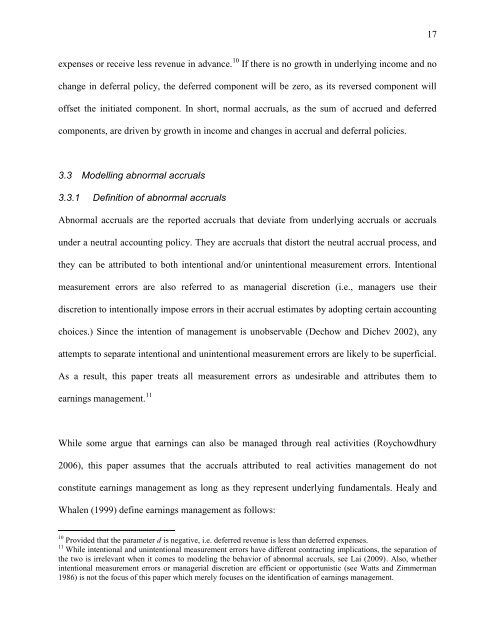Modelling the accruals process and assessing unexpected accruals*
Modelling the accruals process and assessing unexpected accruals*
Modelling the accruals process and assessing unexpected accruals*
You also want an ePaper? Increase the reach of your titles
YUMPU automatically turns print PDFs into web optimized ePapers that Google loves.
expenses or receive less revenue in advance. 10 If <strong>the</strong>re is no growth in underlying income <strong>and</strong> no<br />
change in deferral policy, <strong>the</strong> deferred component will be zero, as its reversed component will<br />
offset <strong>the</strong> initiated component. In short, normal <strong>accruals</strong>, as <strong>the</strong> sum of accrued <strong>and</strong> deferred<br />
components, are driven by growth in income <strong>and</strong> changes in accrual <strong>and</strong> deferral policies.<br />
3.3 <strong>Modelling</strong> abnormal <strong>accruals</strong><br />
3.3.1 Definition of abnormal <strong>accruals</strong><br />
Abnormal <strong>accruals</strong> are <strong>the</strong> reported <strong>accruals</strong> that deviate from underlying <strong>accruals</strong> or <strong>accruals</strong><br />
under a neutral accounting policy. They are <strong>accruals</strong> that distort <strong>the</strong> neutral accrual <strong>process</strong>, <strong>and</strong><br />
<strong>the</strong>y can be attributed to both intentional <strong>and</strong>/or unintentional measurement errors. Intentional<br />
measurement errors are also referred to as managerial discretion (i.e., managers use <strong>the</strong>ir<br />
discretion to intentionally impose errors in <strong>the</strong>ir accrual estimates by adopting certain accounting<br />
choices.) Since <strong>the</strong> intention of management is unobservable (Dechow <strong>and</strong> Dichev 2002), any<br />
attempts to separate intentional <strong>and</strong> unintentional measurement errors are likely to be superficial.<br />
As a result, this paper treats all measurement errors as undesirable <strong>and</strong> attributes <strong>the</strong>m to<br />
earnings management. 11<br />
While some argue that earnings can also be managed through real activities (Roychowdhury<br />
2006), this paper assumes that <strong>the</strong> <strong>accruals</strong> attributed to real activities management do not<br />
constitute earnings management as long as <strong>the</strong>y represent underlying fundamentals. Healy <strong>and</strong><br />
Whalen (1999) define earnings management as follows:<br />
10 Provided that <strong>the</strong> parameter d is negative, i.e. deferred revenue is less than deferred expenses.<br />
11 While intentional <strong>and</strong> unintentional measurement errors have different contracting implications, <strong>the</strong> separation of<br />
<strong>the</strong> two is irrelevant when it comes to modeling <strong>the</strong> behavior of abnormal <strong>accruals</strong>, see Lai (2009). Also, whe<strong>the</strong>r<br />
intentional measurement errors or managerial discretion are efficient or opportunistic (see Watts <strong>and</strong> Zimmerman<br />
1986) is not <strong>the</strong> focus of this paper which merely focuses on <strong>the</strong> identification of earnings management.<br />
17



